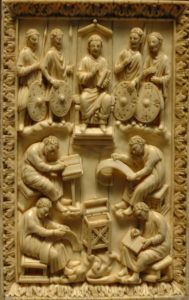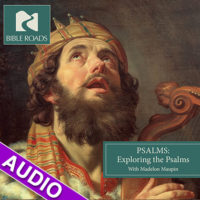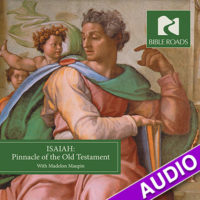“Praise the Lord!” And so begins one of the glorious types of Psalms (Ps. 111) from the Psalter, built on a recognition of God’s many blessings. What a perfect time of year to consider the Thanksgiving Psalm more deeply and maybe even write your own!

David dictating the Psalms. Codex binding in ivory, from the Treasure of Saint-Denis, France, end of 10th century.
There are many types of Psalms, but two predominate: the praise psalm and the lament. The former is often sung as a hymn and the latter, a lament, is a prayer. Both types of Psalms are found applying to either individuals or whole communities. The Thanksgiving Psalm begins where the lament leaves off– the gratitude expressed for the very thing or situation that had before seemed so insurmountable.
Thanksgiving Psalms are complements to laments because they provide concrete testimony to answered prayer. Just as laments are cries for help during a crisis, Thanksgiving Psalms are their natural corollary because they declare: “My prayer is answered.”
Yet Thanksgiving Psalms are more than hymns of praise because they relish the language of proclamation of what God has done and is doing for both the individual and community.
The Psalter has long served as one of the most loved portions of the Hebrew Scriptures, treasured by Jew and Christian alike, and quoted more in the New Testament than any other Old Testament book. Perhaps one reason for the Psalms’ timeless appeal is that all 150 Psalms teach us how to pray, how to feel God’s presence. They show why we can have unwavering confidence in God’s power to deliver men, women and children from every kind of evil that would intimidate, threaten or bully.
An example comes from one of my earliest childhood memories. My mother, brother and I were shouting the 23rd Psalm together as we held hands in our Oklahoma home’s small hallway, the only room where flying glass couldn’t reach us. It was our way of remembering that God’s power is greater than any tornado funnel, including the nearby one which sounded like a freight train about to come through the house. Not just that year but all our growing up years, we experienced protection and safety from diseases, accidents, school challenges and sports, and the Psalms were a significant part of those prayers.
Here are some Thanksgiving Psalms you might enjoy reading this season (Ps. 30, 46, 48, 66. 76, 126, 135, and 147), along with an extended portion here of Ps. 111.
*1 Praise the Lord!
I will thank the Lord with all my heart
as I meet with his godly people.
2 How amazing are the deeds of the Lord!
All who delight in him should ponder them.
3 Everything he does reveals his glory and majesty.
His righteousness never fails.
4 He causes us to remember his wonderful works.
How gracious and merciful is our Lord!
5 He gives food to those who fear him;
he always remembers his covenant…
7 All he does is just and good,
and all his commandments are trustworthy.
It is always a joy to hear from you, our thoughtful readers. Please share how you think about these Thanksgiving Psalms, or better yet, share a verse of one you’ve penned to capture your own gratitude this beautiful season of giving thanks.




Psalm 100 has been my “go to” thanksgiving psalm. Not just for the thanks, but for the reminder of who we are: “Know ye that the Lord he is God: it is he that hath made us, and not we ourselves;” and in fact I just love the entire Psalm because it is so inclusive: “…his truth endureth to all generations.”
Madelon, a timely reminder that the “thanksgiving” psalm begins where the “lament” leaves off. There’s been quite a season of lament. Now is the season of thanksgiving!
Psalm 145, not strictly a psalm of thanksgiving, is one of my favorites — sung at the midday meal in the ancient Church (v. 15). And a good one to sing every day rejoicing in God’s tender care for all. Joyful Thanksgiving to you and George.
Ginny Stopfel